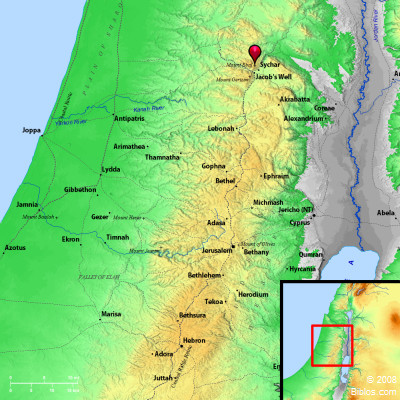Atlas  Mount Ebal and surrounding region
Maps Created using Biblemapper 3.0Additional data from OpenBible.info
You are free to use up to 50 Biblos coprighted maps (small or large) for your website or presentation. Please credit Biblos.com. Occurrences Deuteronomy 11:29 It shall happen, when Yahweh your God shall bring you into the land where you go to possess it, that you shall set the blessing on Mount Gerizim, and the curse on Mount Ebal. Deuteronomy 27:4 It shall be, when you have passed over the Jordan, that you shall set up these stones, which I command you this day, in Mount Ebal, and you shall plaster them with plaster. Deuteronomy 27:13 These shall stand on Mount Ebal for the curse: Reuben, Gad, and Asher, and Zebulun, Dan, and Naphtali. Joshua 8:30 Then Joshua built an altar to Yahweh, the God of Israel, in Mount Ebal, Joshua 8:33 All Israel, and their elders and officers, and their judges, stood on this side of the ark and on that side before the priests the Levites, who carried the ark of Yahweh's covenant, the foreigner as well as the native; half of them in front of Mount Gerizim, and half of them in front of Mount Ebal, as Moses the servant of Yahweh had commanded at the first, that they should bless the people of Israel. Encyclopedia EBAL, MOUNTe'-bal, (har `ebhal; Gaibal):
Rises North of the vale of Shechem, over against Mt. Gerizim on the South. The mountain (Arabic el-Iclamiyeh) reaches a height of 1,402 ft. above the floor of the valley, and 3,077 ft. above the level of the Mediterranean. The Samaritans feign that Gerizim is the higher; but it is more than 200 ft. lower than Ebal. These two mountains overhang the pass through which runs the main artery of intercourse between East and West, the city of Nablus lying in the throat of the valley to the West. The ancient Shechem probably stood farther to the East. The lower slopes of Ebal as one ascends from Nablus are covered with gardens and orchards, the copious streams from the fountains under Gerizim washing its foot, and spreading fertility and beauty. The vine, the fig and the olive grow luxuriantly. Higher up we scramble over rough rocky terraces, where grow only the ubiquitous thistles and prickly shrubs.
From the broad summit a view of surpassing interest and beauty rewards the climber's toil. Westward beyond the hills and the plain of Sharon with its coast line of yellow sand running from Jaffa to Carmel, stretch the blue waters of the Mediterranean. From Carmel to Gilboa, Little Hermon and Tabor, roll the fruitful breadths of Esdraelon: the uplands of Galilee, with Nazareth showing on the brow above the plain, rise away to the buttresses of Lebanon in the North. From the snowy peak of Hermon the eye ranges over the Jaulan and Mount Gilead to the Mountain of Bashan in the East, with the steep eastern wall of the Jordan valley in the foreground. The land of Moab is visible beyond the Dead Sea; and the heights around Jerusalem close the view on the South.
Round this splendid mountain, seen from afar on all sides, religious associations have gathered from old time. The Moslem Weley on the top-the usual white-domed sanctuary-where it is said the head of the Baptist is buried, is doubtless the modern representative of some ancient seat of worship. The ruins of a church show that Christians also came under the spell of the hill.
The slopes of Ebal toward Gerizim played their part in that memorable scene, when, having conquered the central region of Palestine, Joshua led the people hither, erected an altar of unhewn stones, wrote upon the stones-either engraving on the stone itself, or impressing on plaster placed there for the purpose-a copy of the law, and then, as Moses the servant of the Lord had commanded, placed half the tribes on the slope of Gerizim, and half on those of Ebal, and the ark with the priests and Levites in the center. Then with dramatic responses from the two divisions of the people, the blessings and the cursings of the law were read (Joshua 8:30; compare Deuteronomy 27:11). In all the future, therefore, this mountain, towering aloft in the very heart of the land, would remind beholders far and near of their people's covenant with God. It has sometimes been questioned if the reading of the law could be heard by the people in the way described. The formation of the sides of the valley at the narrowest part, and the acoustics, which have been tested more than once, leave no reasonable doubt as to the possibility.
The importance of the mountain from a military point of view is illustrated by the ruins of a massive fortress found on the summit.
W. Ewing
E'BAL, one of two mountains, 27 ms. n. of Jerusalem and very near to each other at their bases. Mt. Gerizim was the other mountain on the s. and its top was 1 2/3 m. distant from that of Ebal. Ebal is 3077 ft. and Gerizim 2849 ft. above the sea. The valley between them is about 1900 ft. above the sea and in this valley is the town of Shechem which is 5/8 of a mile in length. |




